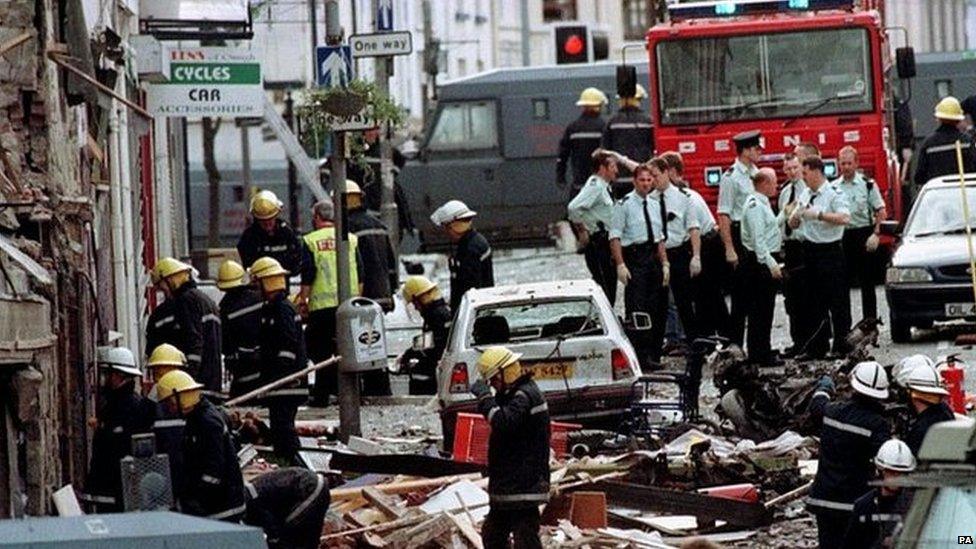UK government announces independent Omagh bomb statutory inquiry
- Published
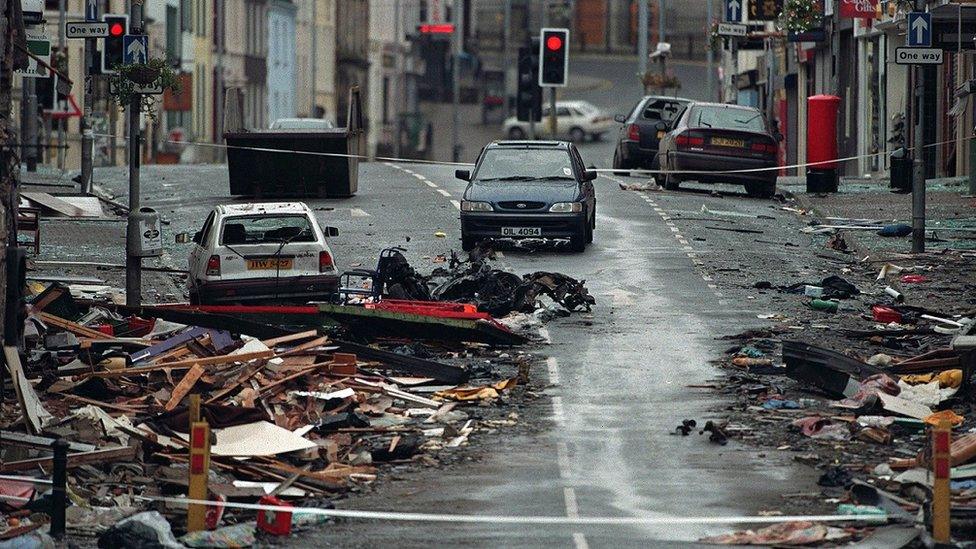
Bereaved families have been campaigning for an inquiry into the bombing for more than a decade
There will be an independent statutory inquiry into the Omagh bombing, the UK government has confirmed.
Twenty-nine people died after the bombing in the County Tyrone town on 15 August 1998 - the biggest single atrocity in the Troubles.
Bereaved families have been campaigning for an inquiry for more than a decade.
In July 2021, a Belfast court ruled there should be a new investigation into whether the attack, by the Real IRA, could have been prevented.
Michael Gallagher, whose son Aiden died in the bombing, took the legal challenge that resulted in the judge directing the state to act.
"It's going to be a difficult process"
He welcomed NI Secretary Chris Heaton-Harris' announcement of the inquiry as "fantastic news".
"I thought that it was something that I would never hear... It is a very important step forward," said Mr Gallagher.
What has the government announced?
The government has described the inquiry as an "independent statutory inquiry" rather than the more well-known term "public inquiry".
It would have the full powers of the Inquiries Act 2005, the act under which public inquiries are normally held, the Northern Ireland secretary told the House of Commons on Thursday.
The act states that the chairman of a public inquiry "must take such steps as he considers reasonable" to allow the public and press to attend the inquiry and view a record of evidence and documents provided.
But the government suggested in the case of the Omagh Inquiry, it would be up to the chairman to decide how much of the inquiry was public.
NI Secretary says the decision to hold an inquiry is significant
Mr Heaton-Harris said the inquiry, which would be established as promptly as possible, would examine four issues identified by the 2021 High Court ruling.
These include:
The handling and sharing of intelligence
The use of mobile phone analysis
Whether there was advance knowledge or reasonable means of knowledge of the bomb
Whether disruption operations could or should have been mounted, which may have helped prevent the Real IRA attack
The 2021 High Court ruling said there should be an investigation on both sides of the border into whether intelligence information could have prevented the Real IRA attack.
The judge, Mr Justice Horner, said on the basis of evidence he heard it was plausible the bombing could have been stopped.


At a time when the government is planning to draw a line under the past through shutting down inquests and others investigations, launching a new inquiry into the Omagh bombing will strike a chord with other victims and their families.
But the government will argue that the bombing falls outside its Troubles Legacy Bill as it happened after the 1998 Good Friday Agreement was signed.
The inquiry will also have a narrow focus - to establish if the bombing could have been prevented had intelligence information been acted upon.
But the lesson other victim's families will take from today is that the government will only act when the courts demand it.
That is why we can expect legal challenges to the government's controversial legacy legislation when it becomes law.

He did not state the investigation needed to be in the form of a public inquiry.
The Northern Ireland secretary travelled to Omagh in December to meet some of the bereaved families and visit the site of the bombing and a nearby memorial garden.
On Thursday, he told the House of Commons it was "a very sobering experience".
What happened at Omagh?
The Omagh bomb exploded on 15 August 1998, killing 29 people including a woman pregnant with twins.
The bombing came four months after the signing of the Good Friday Agreement, the peace deal that eventually brought an end to decades of violence known as the Troubles.
The 29 victims of the Omagh bombing
It was carried out by dissident republican group the Real IRA, which split from the much larger Provisional IRA after objecting to its ceasefire of 1997.
No-one has ever been convicted of the atrocity.
Real IRA leader Michael McKevitt, who died in 2021, was found responsible for the Omagh bombing in a civil case in 2009, with three other men - Liam Campbell, Colm Murphy and Seamus Daly - also being found liable for the attack.
The four men were named by Mr Justice Morgan in a ruling made as part of a landmark case taken by some of the families of the victims.
The 12 relatives were awarded more than £1.6m in damages for the attack but to date nothing has been paid.
What has the reaction been?
Claire Radford, who was 15 at the time, lost her 16-year-old brother Alan Radford in the bombing.
She told BBC News NI that while she welcomed any inquiry, she had some reservations that the blame may be shifted from the Real IRA and onto the security forces.
"In my own heart and mind, yes, there was intelligence that should've been passed on, they could've acted on it, things could've been a lot different, but it doesn't take away from what's happened," she said.
"Omagh did happen. My brother isn't here.
"The impact of this lives on forever and that will go on for generations, it doesn't just end."
Michael Gallagher, whose son Aiden died in the bombing, said the inquiry was an important step forward for families who wanted to know exactly what happened.
"We will be of course part of this but a little on the side lines," he told the BBC's Evening Extra programme.
"And that's not a bad thing. Because we are in the 25th year now and you do run out of energy, but it is important nevertheless to get those answers."

Omagh people still carry the trauma
The weather in the town reflects the mood: dreary and dark.
Many of the bereaved families have been campaigning for an inquiry into the Omagh bombing for more than a decade.
Others fear it will open old wounds.
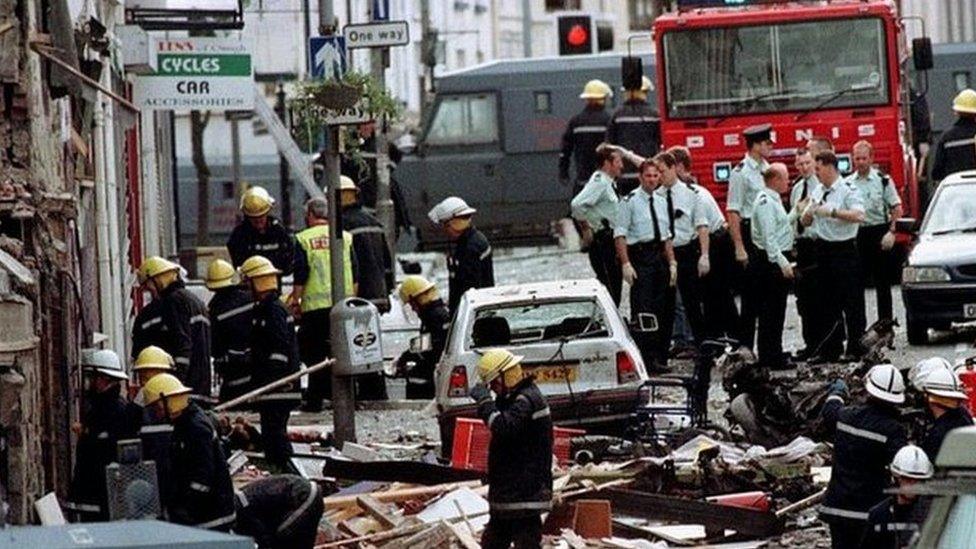
The bombing was carried out by the Real IRA just months after the Good Friday Agreement was signed
It doesn't take you long to walk around the town and find people who still carry that trauma every day.
"It's a day I'll never forget," said one woman.
"I just remember the noise and then the silence, then the chaos and devastation that ensued after. It'll stay with me forever."

The inquiry's announcement has been widely welcomed across the political divide in the UK and Northern Ireland.
Labour shadow NI secretary Peter Kyle commended Mr Heaton-Harris for putting the victims first in his deliberations.
"The Republic of Ireland now has a moral obligation to start their own investigation," he added.
While having no jurisdiction to order the Irish government to act on the matter, Mr Justice Horner urged authorities there to establish their own probe in light of his findings.
Taoiseach (Irish Prime Minister) Leo Varadkar said the Republic of Ireland would not be found wanting" in any inquiry into the Omagh bomb.
"There was probably a cross-border element to this crime and we are going to sit down with the UK authorities and work out how we can contribute to that," he told RTÉ.
'Got to be thorough'
But Lord Saville, who chaired the Bloody Sunday Inquiry, said he was not persuaded a parallel inquiry would be a good idea.
"A parallel process... is going to double the cost but it also has the prospect of two inquiries coming to different conclusions," he told Evening Extra.
"I'd need a great deal of persuasion that this was a case where two inquiries is a vital element."
He said the inquest has to be through but fair, adding: "You've got to give all those people who may be subjected to criticism the opportunity to come forward and explain what they said and did."
Former police ombudsman Baroness O'Loan, who published a report into the bombing in 2001 that was highly critical of the police, said there must be "a sufficient degree of public hearing for there to be any confidence" in the inquiry.
She told BBC News NI's The View: "I think that an enormous amount of the material which will be disclosed to this inquiry will be material which has been made public previously.
"I think that will make it easier for the inquiry to hold its hearings in public."
- Published2 February 2023
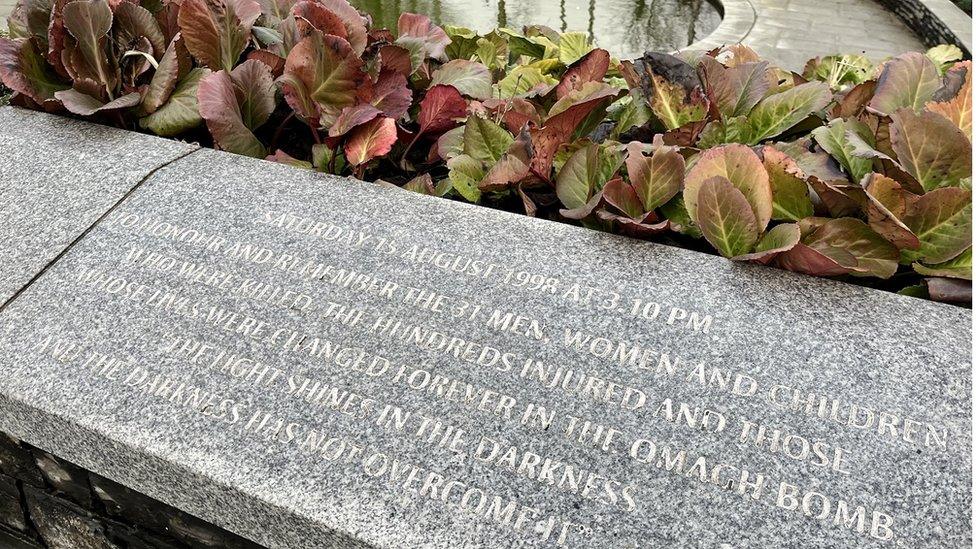
- Published28 January
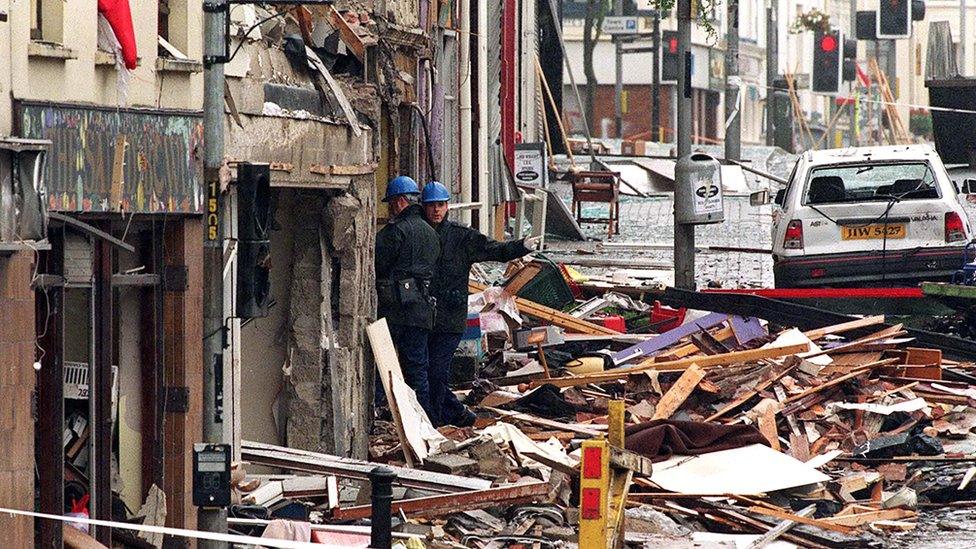
- Published2 February 2023
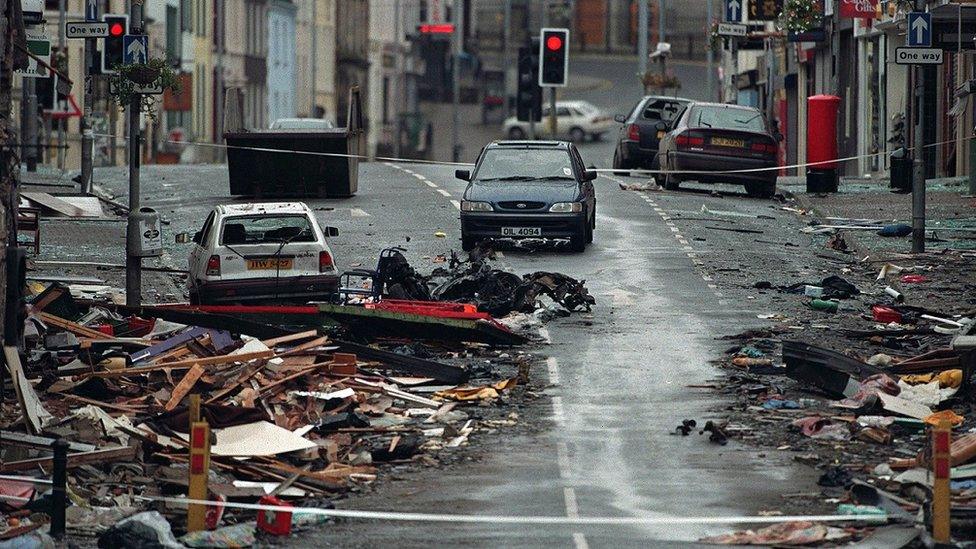
- Published8 October 2021

- Published15 November 2022
